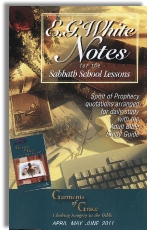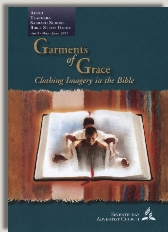|
||||||||||||||
Commentary on "In the Shadow of His Wings"
Day 3: Monday, May 9, 2011 - Nathan Bares All
Observations
This lesson tells of Nathan coming to David with the story of a man with flocks of sheep who took the single lamb of a poor man to prepare as food for a visitor. David's reaction was immediate: "The man who has done this deserves to die..."
Nathan reveals David is the man in the parable, and David repents saying, "I have sinned against the Lord." Nathan responds with, "The Lord also has put away your sin." David prostrates himself in repentance, but the child he and Bathsheba conceived died. David reacts to the child's death by bathing, changing his clothes, anointing himself, and worshiping God.
Observations
The lesson makes the point that Nathan skillfully revealed David's sin to him using a parable, arousing his sense of justice without his feeling judged--and finally resulting in David's condemning himself.
Again, the focus on Nathan's use of a parable to make his point trivializes the story. The parable was, indeed, a good way to engage David's critical assessment without muddying his perception with his own guilt. But Nathan did want David to experience his legitimate guilt. Moreover, Nathan pointed out that God would reveal before the entire nation the results of his sin: the child born would die.
The lesson asks this question, "Why was the Lord able to put away,or cover, David's sin?" Then it directs the reader to 1 John 1:9:
If we confess our sins, he is faithful and just to forgive us our sins and to cleanse us from all unrighteousness.
The clear implication of this question followed by this verse is that God can only forgive our sins if we confess them. This point misses the biblical truth that God can only forgive sin if there is a death to atone for that sin.
David lived under the Mosaic covenant. He was required to offer sin and guilt offerings to God for unremembered sins; purposeful sins, however, had no prescribed offering. Instead, the Mosaic law provided for natural consequences to fall on the person who committed willful sin.
God did not forgive David simply because he repented. Rather, He forgave David because David trusted Him, and because the Lord Jesus is the lamb slain from the foundation of the world.
We learn in Romans 3:22b-26 why God could forgive David:
For there is no distinction: for all have sinned and fall short of the glory of God, and are justified by his grace as a gift, through the redemption that is in Christ Jesus, whom God put forward as a propitiation by his blood, to be received by faith. This was to show God's righteousness, because in his divine forbearance he had passed over former sins. It was to show his righteousness at the present time, so that he might be just and the justifier of the one who has faith in Jesus.
This passage reveals that God "passed over" the sins committed before the cross because God's eternal purpose was that God in the person of the Lord Jesus would die as a propitiation for human sin for all time.
God forgave David on the basis of Jesus' blood...even before Jesus died. David could not experience the washing of forgiveness until he admitted his sin and asked God to forgive him. When he "owned" it and threw himself on the mercy of God, then--on the basis of Jesus blood which saves to the uttermost forever--God ministered His forgiveness to David.
Two points need mentioning: first, the lesson's point that David's confession gave God the right or permission to forgive David is the central concept of the investigative judgment: Jesus only applies His blood to those sins which have been specifically confessed. All forgotten sin and otherwise unconfessed sins He will not blot out.
This concept is heresy. God does not forgive on the basis of our repentance. He forgives on the basis of Jesus' blood—and all those who have repented of their natural, unavoidable sin are forgiven of their sins, past, present, and future. But we must be under the blood—born again through believe and trust in the Lord Jesus--to receive this forgiveness.
Salvation and forgiveness do not depend upon US or anything we do. Our repentance does not secure forgiveness. Jesus' blood secures our forgiveness. We just don't experience it until we give up control to Him and place our faith in His sacrifice and resurrection.
Second, 1 John 1:9 is written to believers who have been born again. It is not a statement for natural man who is still dead in sin. It is written to believers whose spirits have been made alive already by the Holy Spirit. The recipients of 1 John had already repented and received the blood of Jesus as their atonement for sin. The repentance of 1 John 1:9 is the repentance of believers who are already saved.
After we are born again, our still-sinful flesh will still sin. Now, however, we have the choice--for the first time--to submit our temptations and struggles to Jesus whose Spirit indwells our spirits. He also convicts us when we sin, and He leads us to repent. This is not repentance for salvation; this is repentance for keeping ourselves in the love of God with a clean slate between us. This repentance keeps us able to be vulnerable to the Lord Jesus and responsive to His word and to His Spirit who convicts us of the truth of His word, teaching us to live lives as living sacrifices to Him (Rom 12:1).
Adventism teaches that one unconfessed sin can keep us out of heaven. The Bible teaches that not being born again of the Spirit is the one thing that keeps people out of heaven.
We are not saved or lost on the basis of "sin". We are saved or lost on the basis of our relationship to the Sin Bearer. When Jesus died, his death was sufficient to pay for every sin committed by every human for all time. When we acknowledge our own hopeless guilt and receive His sacrifice on our behalf, we are forgiven at that moment and indwelt by the Holy Spirit (Eph 1:13-14). We then have the actual life of God in us, connecting us eternally to Him, seating us at the right hand of God in Christ (Eph 2:4-9).
If we refuse to bow before the cross and receive the blood sacrifice of Jesus on behalf of our sin, we remain out of relationship with Him. We remain in the domain of darkness (Co 1:13). If we try to say God didn't need Jesus' blood to be forgiving, we are setting ourselves up as our own spiritual authority instead of allowing God to speak reality to us through His word.
Romans 3:25-26 state that Jesus was a propitiation in His blood to God. We must receive His eternal gift—and when we do, we are born again and pass from death to life (John 5:24). Our sins are covered--all of them--and our ongoing repentance is the fruit of God's Spirit convicting us and softening our hearts to admit our still-sinful impulses, repenting of them, and thus keeping the communication between us and Jesus clean and open.
Summary
- God forgave David because of Jesus' blood, not on the basis of David's repentance.
- Repentance is necessary in order for us to receive God's forgiveness, but when we repent and receive Jesus' sacrifice for our sin, we are saved and made alive by His Spirit.
- We must confess our sins after we are born again in order to keep our relationship with our Father clean and growing. We shut down our spiritual perception and growth if we refuse to confess our sins.
- We are not saved or lost on the basis of our sins; we are saved or lost on the basis of our relationship to the Sin Bearer.
- Jesus is our Substitute. If we do not receive His blood as payment for our sin, we remain in the domain of darkness. If we do receive His blood, we are born again and transferred to the kingdom of God's beloved Son.
Copyright 2011 BibleStudiesForAdventists.com. All rights reserved. Revised May 2, 2011. This website is published by Life Assurance Ministries, Glendale, Arizona, USA, the publisher of Proclamation! Magazine. Contact email: BibleStudiesForAdventists@gmail.com.
The Sabbath School Bible Study Guide and the corresponding E.G. White Notes are published by Pacific Press Publishing Association, which is owned and operated by the Seventh-day Adventist church. The current quarter's editions are pictured above.
Official Adventist Resources
Standard Edition Study Guide Week 7
Teacher's Edition Study Guide Week 7
Easy Reading Edition Study Guide Wk 7
Search the Complete Published Ellen G. White Writings
Please Support This Project


